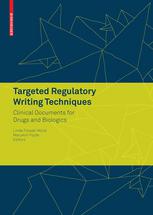

Most ebook files are in PDF format, so you can easily read them using various software such as Foxit Reader or directly on the Google Chrome browser.
Some ebook files are released by publishers in other formats such as .awz, .mobi, .epub, .fb2, etc. You may need to install specific software to read these formats on mobile/PC, such as Calibre.
Please read the tutorial at this link: https://ebookbell.com/faq
We offer FREE conversion to the popular formats you request; however, this may take some time. Therefore, right after payment, please email us, and we will try to provide the service as quickly as possible.
For some exceptional file formats or broken links (if any), please refrain from opening any disputes. Instead, email us first, and we will try to assist within a maximum of 6 hours.
EbookBell Team

4.4
22 reviewsThis book describes the authors’ standard or ‘best’ practices used in writing regul- ed clinical documents for the drug and biologics industry. The fundamental premise of this book is that the end (documents submitted to a health authority) is dep- dent on the beginning (the planning and strategy that go into organizing written documentation). Each regulatory document inherently exists within a constellation of related documents. This book attempts to show the relationships between and among these documents and suggests strategies for organizing and writing these documents to maximize ef?ciency while developing clear and concise text. At all times, and irrespective of applicable laws and guidelines, good communication skills and a sense of balance are essential to adequately, accurately, and clearly describe a product’s characteristics. At no time should the reader perceive these suggestions to be the only viable solution to writing regulatory documents nor should the reader expect that these suggestions guarantee product success. The audience for this book is the novice medical writer, or those who would like to explore or enhance regulatory-writing skills. We assume the reader will have a basic understanding of written communication, but little experience in applying this skill to the task of regulatory writing. Extensive knowledge of science, clinical me- cine, mathematics, or regulatory affairs law is not required to use the best practices described in this book.